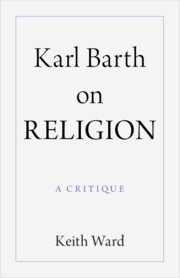Refine search
Actions for selected content:
41 results
9 - Pelagius
- from Part II - Case Studies
-
-
- Book:
- The Cambridge Companion to Christian Heresy
- Published online:
- 17 July 2025
- Print publication:
- 31 July 2025, pp 175-194
-
- Chapter
- Export citation
5 - Sermons on the New Testament
- from Part II - Augustine’s Sermons on the Scriptures and Liturgical Feasts
-
-
- Book:
- The Cambridge Companion to Augustine's Sermons
- Published online:
- 26 May 2025
- Print publication:
- 12 June 2025, pp 98-115
-
- Chapter
- Export citation
God Works for Good with Those Who Love Him: The Church as a Sacrament of Providence, Predestination, and Divine Goodness
-
- Journal:
- New Blackfriars / Volume 106 / Issue 2 / March 2025
- Published online by Cambridge University Press:
- 22 January 2025, pp. 85-100
- Print publication:
- March 2025
-
- Article
- Export citation
‘Hell? Yes!’ Moorean reasons to reject three objections to the possibility of damnation
-
- Journal:
- Religious Studies , First View
- Published online by Cambridge University Press:
- 18 December 2024, pp. 1-13
-
- Article
-
- You have access
- Open access
- HTML
- Export citation
6 - The Failure of Religion
-
- Book:
- Karl Barth on Religion
- Published online:
- 14 November 2024
- Print publication:
- 21 November 2024, pp 97-116
-
- Chapter
- Export citation

Karl Barth on Religion
- A Critique
-
- Published online:
- 14 November 2024
- Print publication:
- 21 November 2024
3 - Puritanism and Predestination
- from Part I - The Origins of Cambridge Platonism
-
- Book:
- The Cambridge Platonists and Early Modern Philosophy
- Published online:
- 09 May 2024
- Print publication:
- 16 May 2024, pp 61-87
-
- Chapter
- Export citation
6 - Is God an Arbitrary Tyrant?
- from Part II - Rival Conceptions of God and Goodness:
-
- Book:
- The Cambridge Platonists and Early Modern Philosophy
- Published online:
- 09 May 2024
- Print publication:
- 16 May 2024, pp 141-175
-
- Chapter
- Export citation
Chapter 5 - Piers Plowman and the Inappropriable
-
- Book:
- The Theology of Debt in Late Medieval English Literature
- Published online:
- 04 January 2024
- Print publication:
- 18 January 2024, pp 136-171
-
- Chapter
- Export citation
2 - The Human Life of God
- from Part I - The Divine-Human Life
-
- Book:
- An Augustinian Christology
- Published online:
- 02 November 2023
- Print publication:
- 16 November 2023, pp 72-110
-
- Chapter
- Export citation
Chapter 27 - The Language of Mystery
- from Part IV - Laudianism and Predestination
-
- Book:
- On Laudianism
- Published online:
- 05 October 2023
- Print publication:
- 19 October 2023, pp 360-365
-
- Chapter
- Export citation
Chapter 3 - Andrewes’ Anti-Puritanism
- from Part I - Laudianism: Where It Came From
-
- Book:
- On Laudianism
- Published online:
- 05 October 2023
- Print publication:
- 19 October 2023, pp 66-79
-
- Chapter
- Export citation
Chapter 6 - Absent Presences
- from Part I - Laudianism: Where It Came From
-
- Book:
- On Laudianism
- Published online:
- 05 October 2023
- Print publication:
- 19 October 2023, pp 93-100
-
- Chapter
- Export citation
Chapter 4 - Puritan Politics
- from Part I - Laudianism: Where It Came From
-
- Book:
- On Laudianism
- Published online:
- 05 October 2023
- Print publication:
- 19 October 2023, pp 80-84
-
- Chapter
- Export citation
Chapter 26 - Laudianism, Puritanism and Arminianism Revisited
- from Part IV - Laudianism and Predestination
-
- Book:
- On Laudianism
- Published online:
- 05 October 2023
- Print publication:
- 19 October 2023, pp 353-359
-
- Chapter
- Export citation
5 - Necessity, Free Will and Conscience
-
- Book:
- The Necessity of Nature
- Published online:
- 16 February 2023
- Print publication:
- 23 February 2023, pp 136-162
-
- Chapter
-
- You have access
- Open access
- HTML
- Export citation
Demonic Assault, Providence, and the Search for Salvation in Early Modern Reformed English Protestant Theology
-
- Journal:
- Church History / Volume 91 / Issue 4 / December 2022
- Published online by Cambridge University Press:
- 03 May 2023, pp. 753-779
- Print publication:
- December 2022
-
- Article
- Export citation
Chapter 3 - You Searched Me and Knew Me
-
-
- Book:
- Theological Determinism
- Published online:
- 30 September 2022
- Print publication:
- 22 September 2022, pp 47-64
-
- Chapter
- Export citation
Chapter 13 - The Problem of Trust
-
-
- Book:
- Theological Determinism
- Published online:
- 30 September 2022
- Print publication:
- 22 September 2022, pp 213-230
-
- Chapter
- Export citation
5 - Calvin, Tradition, and Doctrine
-
- Book:
- Calvin and the Christian Tradition
- Published online:
- 26 May 2022
- Print publication:
- 09 June 2022, pp 143-202
-
- Chapter
- Export citation
